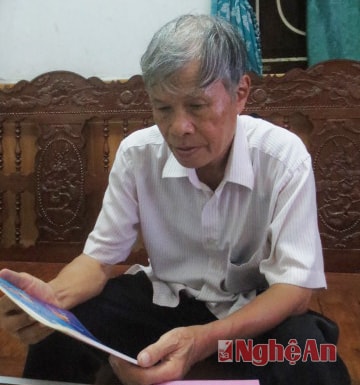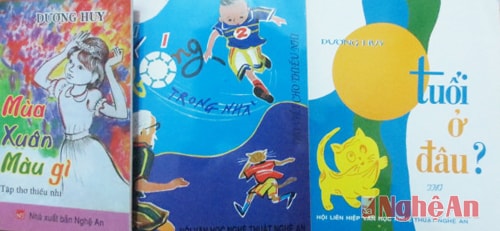Duong Huy, children's poet
(Baonghean) - To the children who have to carry and eat along Phong Dinh Cang street in Vinh city, Duong Huy is a "strange old man" who always knows how to make it interesting for them to "open their mouths wide" and "swallow quickly". To the neighbors around house number 196, Duong Huy is a simple "walking old man", somewhat sloppy, but full of humor. To us, the Nghe An newspaper people, Duong Huy is a close and dear colleague, father, and uncle. He is not only the first generation journalist of Nghe An newspaper but also a famous poet for children.
 |
| Poet Duong Huy |
Duong Huy - a 76-year-old poet, may still surf the web every day, with a computer at his disposal, but he still likes to handwrite articles and poems to send to editorial offices. In recent years, he has completely given up his bicycle to become an "old man walking" on the sidewalks of Vinh Street. One would think that he is slow and leisurely, but he is constantly updated with domestic and international information, his short stories and satirical poems are hot and current...
And talking with him, I realized how much youthfulness and mischief was hidden deep inside that thin, calm person. “If I wasn’t mischievous, how could I write for the world of children?” He said with a smile and then read me an “illustrative” poem, a poem that many children loved and knew by heart: “In the series of natural numbers/ Number 0 is inherently mischievous/ He is chubby/ But he is poor and has nothing/ Adding a tail suddenly makes him fat/ Number 0 becomes number 9/ Hanging it upside down to count/ Number 9 loses three/ Playing with buds and flowers/ Two zeros become 8/ Leaning on a stick to visit a friend/ Number 0 becomes number 10”.
Duong Huy said, he has many “titles”, many “positions”, if he were to receive a commemorative medal, it would be quite a lot, such as being a founding member of the provincial Literature and Arts Association, a member of the first Executive Committee of the Association, one of the first generations of Nghe Tinh Newspaper, the first Secretary of the Youth Union of the newspaper, then Chairman of the Nghe An Literature and Arts Association, Editor-in-Chief of Song Lam Magazine… In writing, he also has many strengths, such as folk songs during the years of fighting against the US, satirical poetry, writing short stories, children's poetry… He also stumbled over words many times, there were times he was disciplined, threatened because of… satirical poetry. But his most noble “title”, the thing he is most proud of is “children's poet”. And it was also children's poetry that made him a member of the Vietnam Writers Association in 1983.
 |
| Some poetic works of poet Duong Huy. |
However, he started with children's poetry later than his other "fields" of topics and genres. Duong Huy said that he began his literary career with...folk songs. That was the year he was in his hometown, working as a Youth Union member in the Commune Committee Office. At the age of 16, Duong Huy composed folk songs to encourage the production movement and motivate people in the cooperative. In 1957, he attended the first National Young Writers Conference. That was also the time when a true farmer from the countryside met and lived with famous names such as Nguyen Khai, Che Lan Vien...
He said that it was not by chance that he knew how to compose. Duong Huy was born into a family where his father was a scholar who taught and often wrote poetry. His mother was a woman who worked as a weaver, did not know how to write poetry but knew a lot of poems. In particular, the small Diem hamlet of Quynh Doi village, Quynh Luu, where he lived, was the hometown of the Queen of Nom poetry Ho Xuan Huong and many other talented poets, a hamlet with many famous names in the mandarin examinations. He said that in his house, as well as many other houses in the hamlet, the elders often sat together to discuss poetry, literature, and current events, and the children also ran in and out, shouting and teasing each other, imitating... writing poems. They started with playful poems joking with each other, "this one has a big mouth, that one has a missing tooth".
The irony and irony also "absorbed" him from that day. Later, when he had matured in his writing and known many "artistic techniques", he still remembered his very "naive, honest" folk song written during the years of fighting against the US: "Uncle Ho taught us/ As long as the US is fighting, we will not spare a single one/ We promise Uncle that/ As long as the US is fighting, we will not spare a single one". With this folk song, he also had unforgettable memories with it. That was the time he returned to work at Nghe Tinh Newspaper, the time he went down to the base, which was also his hometown Quynh Luu, he encountered a bomb attack on the road. When the bombing stopped, on a collapsed wall, he saw his "poem" still intact, carefully drawn by the painter. At that time, he was very moved...
Later, people mentioned Duong Huy's folk songs, saying that he was only "behind Tran Huu Thung". Then from folk songs, to satirical poems, to "To whisper to each other" - a special "criticism and self-criticism" column in Nghe An newspaper at that time, it was not until 1977 that Duong Huy stepped into the field of children's poetry. At that time, he was sent to Ho Chi Minh City to study at the Central Propaganda School 3. Missing his children in the North, combined with his love for children, and having free time while seeing the bustling atmosphere of journalism in the South, Duong Huy practiced writing for children to send to newspapers. After finishing his studies, he went to the North to participate in a writing contest for children launched by the Vietnam Writers Association in coordination with the Central Youth Union and won a prize. Duong Huy's name was noticed and known in the field of children's poetry.
He said, he came to the world of children starting with the longing for his children and the longing for his own childhood. His children, during their childhood, rarely lived with their father, rarely held and cared for by him because they followed their mother to evacuate, while he had to stay at the office, then go to school, go on business trips... He wrote for his children, and also to write for himself. For the nostalgia of the Diem neighborhood, which witnessed his difficult but mischievous, innocent but fierce childhood. There, there was a hungry boy, whose father was teaching far from home, who ran all over the fields near and far to find small fish and shrimp, to pick up rice grains and potatoes to help his mother. There, there was a mother who lit a peanut oil lamp every night so that she could weave while her child studied.
Mother sat weaving all night, reciting poems, singing to avoid sleepiness, also to remind herself to be steadfast in her integrity. Later, Duong Huy was startled to realize that his mother had been reading Uncle Ho's poems and revolutionary verses since that day. Is that why she had survived 2 years of torture and beatings from the enemy (poet Duong Huy's mother was the first Quynh Luu woman to be imprisoned by the French, a veteran revolutionary 30-31). Her singing, humming voice, until now still sinks into his memory. Every time it resounds, he sees himself as the boy of those years, sitting next to the peanut oil lamp...
When Duong Huy was over 10 years old, his mother passed away. He became an orphan, so poor that he had to go to work to survive. However, he was always grateful for that difficult childhood. The sadness of childhood, why was it still so pure to him? His five brothers grew up together, and now, some died, some remained, some became martyrs (but lived forever in his poems). He said that the poem chosen to be taught in his third grade textbook was written about his family's situation, about his younger brother, a martyr whose grave has not yet been found: "Where are you, where are you?/ Truong Son is so long/ Truong Sa is an island floating and sinking/ Or Kon Tum, Dak Lak?/ Mother rubs her eyes with red flowers/ Father looks up at the altar/ The country is no longer an enemy/ Uncle is with Uncle Ho".
Duong Huy said, writing poetry for children is not difficult. But don't be difficult when writing for them. Let all the most innocent feelings speak up, don't be busy thinking about having to teach, having to incorporate "lessons" into it. From writing poetry for children, he became passionate about observing the world of children. Try reading a poem selected for his first grade textbook, "The boat sleeps on the beach": "Uncle boat sleeps strangely / He refuses to climb onto the bed / He lies face down on the yellow sand / His ear tilted towards the sea". Observing passionately is not enough, it must be full of subtlety, full of love, full of humor, it must be the children themselves, to be able to feel "Uncle boat" like that. That is also the unique feature of him and his poetry.
For Duong Huy, life around in the eyes of children is always new, attractive, always arousing curiosity. That is why children often ask: "Where is age?" (The goat picks the buds/ Age hangs on its chin/ The pig often lies/ Age hugs its belly). "What color is spring?" (Spring is green/ When going to the fields to visit the rice/ Spring is red with fire/ When lighting up peach buds). And Duong Huy, the "old man walking" that people in Vinh often meet every day, has opened up that innocent world for us to see, for us to look back at ourselves with poetry collections for children: "Sweet longan bunch" (published with poet Le Duy Phuong), "Naughty number 0", "Where is age?", "Indoor soccer", "Three mice", "What color is spring?"...
I keep thinking, if there wasn't such a funny Duong Huy in poetry, then poetry for children would be lacking, just like without that "old man walking" on the sidewalk of Vinh street, those picky children would be so sad...
Article and photos:Thuy Vinh






